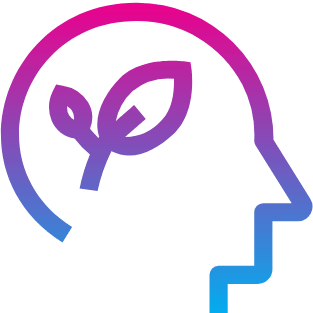Did you know that menopause not only affects your reproductive system but also has a profound impact on your brain health? As you approach your 40s, estrogen levels begin to decline rapidly inside your brain, leading to various menopause symptoms. Estrogen is not just a “female sex hormone”; it plays a crucial role in regulating the menstrual cycle, maintaining bone density, and orchestrating the production of other hormones and metabolic factors. Traditional treatments may not work for everyone because they fail to address the estrogen reduction happening in the brain, the area that loses the most amount of estrogen. In this article, we will delve deeper into the impact of premature menopause on brain health and explore how managing estrogen levels can help alleviate symptoms and improve overall well-being.

Premature menopause age
Premature menopause refers to the condition where a woman experiences menopause before the age of 40. Menopause is the natural cessation of menstrual periods and is typically characterized by a decline in estrogen levels. However, in premature menopause, the decline in estrogen happens at a much earlier age, leading to various physiological and psychological changes.
Age range for premature menopause
The age range for premature menopause is generally considered to be between 40 and 45. However, it is important to note that every woman’s experience may vary, and some may enter menopause even earlier. Premature menopause can occur due to various factors, including genetic predisposition, autoimmune disorders, surgery (such as hysterectomy), chemotherapy or radiation therapy, and certain medical conditions.
Causes of premature menopause
Premature menopause can have various causes, including genetic factors. Some women may have a family history of early menopause, indicating a genetic predisposition. Autoimmune disorders, such as thyroid disease or rheumatoid arthritis, can also contribute to premature menopause. Additionally, certain treatments, such as chemotherapy or radiation therapy for cancer, can accelerate the decline of estrogen levels. Surgical removal of the ovaries or uterus can also result in premature menopause.
Impact of premature menopause on brain health
Estrogen plays a crucial role in brain health, and the decline of estrogen levels during menopause can have a significant impact on cognitive function and overall brain health. Estrogen receptors are present throughout the brain, and the hormone acts as a neuroprotective agent, promoting neuronal growth and synaptic connections.
Estrogen and its role in brain health
Estrogen has various effects on the brain that contribute to overall brain health. It helps to regulate neurotransmitters, such as serotonin and dopamine, which play a role in mood regulation and cognitive function. Estrogen also increases blood flow to the brain, ensuring optimal delivery of oxygen and nutrients. Furthermore, it has antioxidant properties and protects against oxidative stress, which can accelerate brain aging.
Effects of estrogen decline on brain function
The decline of estrogen levels during menopause can have significant effects on brain function. Some women may experience difficulties with concentration, memory, and cognitive processing speed. They may also have mood swings, anxiety, or depression. Sleep disturbances, such as insomnia or restless sleep, are also common during menopause, further impacting brain function.
Neurological symptoms associated with premature menopause
Premature menopause can lead to various neurological symptoms, including headaches, migraines, and dizziness. Some women may also experience sensory changes, such as tingling or numbness in the extremities. These symptoms can be attributed to the hormonal changes and alterations in neurotransmitter levels that occur during menopause.
Cognitive changes during menopause
During menopause, many women may experience cognitive changes, commonly referred to as “menopausal brain fog.” This can manifest as forgetfulness, difficulty concentrating, or feeling mentally “fuzzy.” These cognitive changes are believed to be due to hormonal fluctuations, particularly the decline of estrogen.
Studies on cognitive function and premature menopause
Several studies have focused on examining the impact of premature menopause on cognitive function. These studies have found that women who experience premature menopause may have a higher risk of cognitive decline and dementia later in life. However, it is important to note that individual experiences may vary, and not all women will experience significant cognitive changes.
Impact of hormonal therapy on cognitive function
Hormonal therapy, specifically estrogen replacement therapy, has been shown to have positive effects on cognitive function in menopausal women. Studies have found that estrogen therapy can improve memory, attention, and executive function. However, the risks and benefits of hormonal therapy should be carefully considered, as it may not be suitable for every individual.
Memory changes during menopause
Memory changes are a common complaint during menopause. Many women may experience difficulties with short-term memory, such as remembering where they placed their keys or recalling recent events. These memory changes are believed to be influenced by hormonal fluctuations, particularly the decline of estrogen.
Effects of estrogen decline on memory
Estrogen plays a crucial role in memory formation and retrieval. It enhances synaptic plasticity, which is essential for learning and memory processes. The decline of estrogen levels during menopause can disrupt these processes, leading to difficulties with memory.
Interventions and treatments for memory problems
There are various interventions and treatments available to address memory problems during menopause. Strategies such as maintaining a healthy lifestyle, engaging in regular mental stimulation activities, and practicing stress management techniques can help improve memory function. Additionally, hormone replacement therapy, under medical supervision, may be considered for women experiencing severe memory problems.
Relationship between estrogen and mood
Estrogen levels have a significant influence on mood regulation. The decline of estrogen during menopause can lead to mood swings, irritability, anxiety, and depression. Estrogen is known to affect neurotransmitters, such as serotonin and dopamine, which play a role in mood regulation.

Prevalence of mood disorders in menopausal women
Mood disorders, such as depression and anxiety, are prevalent in menopausal women. Hormonal fluctuations, along with other factors, can contribute to the development or exacerbation of these mood disorders. It is important for women experiencing significant mood disturbances to seek support and appropriate treatment.
Treatment options for mood disorders in menopause
Treatment options for mood disorders in menopause may include therapy, lifestyle modifications, and medication. Cognitive-behavioral therapy (CBT) can be effective in helping women cope with mood disturbances and develop healthy coping strategies. Additionally, lifestyle modifications such as regular exercise, a balanced diet, and stress management techniques can contribute to improved mood. In some cases, medication, such as antidepressants or hormone replacement therapy, may be prescribed.
Connection between estrogen and sleep
Estrogen plays a role in sleep regulation. The decline of estrogen levels during menopause can lead to various sleep disturbances. These may include difficulty falling asleep, staying asleep, or experiencing restless sleep. Hormonal fluctuations, along with other factors such as hot flashes or night sweats, can contribute to sleep problems.
Types of sleep disturbances in menopause
Menopause can lead to various sleep disturbances, including insomnia, frequent awakenings, and changes in sleep patterns. Hot flashes and night sweats can disrupt sleep, leading to poor sleep quality. Additionally, hormonal changes may affect the sleep-wake cycle, making it difficult to achieve restful sleep.
Management strategies for sleep problems
There are several management strategies that can help improve sleep problems during menopause. These include creating a sleep-friendly environment, practicing good sleep hygiene, maintaining a regular sleep schedule, managing stress levels, and seeking medical assistance if necessary. Hormonal therapy may also be considered if sleep disturbances significantly impact quality of life.
Structural changes in the brain during menopause
Menopause can lead to structural changes in the brain. Neuroimaging studies have shown that menopause is associated with a decrease in brain volume, particularly in areas related to memory and cognitive function. These structural changes may contribute to the cognitive changes experienced during menopause.
Effects of estrogen decline on brain structure
The decline of estrogen levels during menopause can contribute to the structural changes observed in the brain. Estrogen has neuroprotective effects and promotes neuronal growth and synaptic connections. The decline of estrogen can disrupt these processes, leading to alterations in brain structure.
Neuroimaging studies on brain structure and menopause
Neuroimaging studies have provided valuable insights into the effects of menopause on brain structure. These studies have shown that menopause is associated with changes in gray matter volume, white matter integrity, and functional connectivity. Understanding these structural changes can help shed light on the cognitive and neurological symptoms experienced during menopause.
Estrogen’s role in cardiovascular health
Estrogen plays a protective role in cardiovascular health. It helps to maintain healthy blood vessel function, regulate cholesterol levels, and reduce inflammation. Estrogen also promotes vasodilation and improves blood flow to the heart and other organs.
Increased risk of cardiovascular disease in menopausal women
Menopause is associated with an increased risk of cardiovascular disease. The decline of estrogen levels can contribute to the development of conditions such as hypertension, atherosclerosis, and heart disease. Other factors, such as age, lifestyle, and genetic predisposition, also contribute to the increased risk.
Preventive measures for cardiovascular health
Maintaining cardiovascular health during menopause involves adopting a healthy lifestyle. Regular exercise, a balanced diet rich in fruits, vegetables, and whole grains, and managing cardiovascular risk factors such as blood pressure and cholesterol levels are essential. It is also important to avoid smoking and excessive alcohol consumption. Regular check-ups with healthcare providers can help monitor cardiovascular health and address any potential issues promptly.
Benefits and risks of hormone replacement therapy
Hormone replacement therapy (HRT) involves the use of estrogen and sometimes progesterone to alleviate menopausal symptoms. HRT has been shown to have benefits in managing various menopausal symptoms, such as hot flashes, night sweats, and vaginal dryness. However, it is important to consider the potential risks, such as an increased risk of blood clots, stroke, and breast cancer.
Impact of hormone replacement therapy on brain function
HRT has been studied for its effects on brain function during menopause. Research suggests that hormone replacement therapy, particularly estrogen therapy, may have positive effects on cognitive function, memory, and mood. However, further research is needed to fully understand the long-term effects and individual variability.
Guidelines for hormone replacement therapy in menopause
The decision to undergo hormone replacement therapy should be made in consultation with a healthcare provider. Guidelines recommend that HRT should be used at the lowest effective dose for the shortest duration possible. It is important to consider individual risk factors, such as age, personal medical history, and family history, when considering HRT. Regular monitoring and follow-up with a healthcare provider are essential to evaluate the benefits and potential risks of HRT.
Exercise and its effects on brain health
Regular exercise has been shown to have numerous benefits for brain health. It promotes the release of endorphins, which improve mood and reduce stress. Exercise also enhances blood flow to the brain, promoting the delivery of oxygen and nutrients. Additionally, it stimulates the production of growth factors that support the growth and survival of neurons.
Nutrition and brain-protective foods
A balanced diet rich in brain-protective foods can contribute to brain health during menopause. Foods such as fatty fish, nuts and seeds, fruits and vegetables, whole grains, and antioxidants have been associated with improved brain function and reduced risk of cognitive decline. It is important to maintain a nutrient-rich diet and stay adequately hydrated for optimal brain health.
Mental stimulation and cognitive reserve
Engaging in mental stimulation activities can help maintain cognitive function and promote brain health during menopause. Activities such as learning new skills, solving puzzles, reading, and engaging in social interactions can stimulate neuronal connections and enhance cognitive reserve. Cognitive reserve refers to the brain’s ability to withstand age-related changes and function efficiently. By engaging in mentally stimulating activities, one can build cognitive reserve and potentially mitigate some of the cognitive changes associated with menopause.
In conclusion, premature menopause can have a significant impact on brain health. The decline of estrogen levels during menopause can lead to cognitive changes, memory problems, mood disorders, sleep disturbances, and structural changes in the brain. It is important to address these challenges and consider various interventions, including lifestyle modifications, hormonal therapy, and mental stimulation, to support brain health during menopause. By understanding the effects of premature menopause on the brain and implementing appropriate strategies, women can enhance their overall well-being and quality of life during this transitional phase of life.




